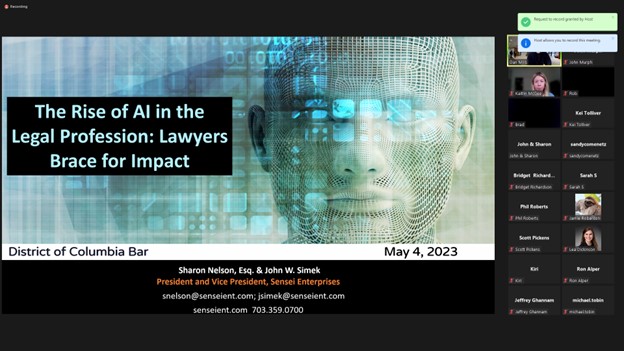Issues & Trends
With AI Rising, Experts Explore Its Impact on Lawyering
May 12, 2023
_1.jpg?width=600&height=336)
When it comes to legal technology, no advancement has dominated the news in 2023 more than ChatGPT. Ever since San Francisco-based OpenAI released ChatGPT in November 2022, the legal world has been engrossed by the potentially game-changing tool, with experts pondering how lawyers should responsibly embrace it and, ominously, whether it will replace them.
On May 4, Sharon Nelson and John Simek, president and vice president, respectively, of Sensei Enterprises, talked about the implications of ChatGPT during the virtual program “The Rise of AI in the Legal Profession: Lawyers Brace for Impact,” presented by the D.C. Bar Practice Management Advisory Service.
ChatGPT (generative pretrained transformer) is a learning-based technology capable of synthesizing tons of data gathered across the internet and delivering conversational, humanlike responses to inquiries and document requests. It can produce legal documents, emails, and letters at lightning speed.
“This perhaps is the most exciting year [for the legal profession] since we started using computers and the internet,” Nelson said. “Our prediction is that [ChatGPT] is going to blow the heck out of law firms in setting up their shops in the metaverse. I think it’s taken over completely.”
“I certainly use it almost daily,” she added. “I give it articles all the time that I’ve written myself, and ChatGPT makes them better without question. It catches all of the errors and omissions. And that is really something.”
Replacement or Personal Assistant?
Nelson and Simek noted that ChatGPT has gained more than 100 million users since November, becoming the fastest-growing app in history. On the likelihood of ChatGPT replacing lawyers, Nelson said lawyers possess certain skills that AI tools cannot replicate.
“It doesn’t have high-level skills like high-level analysis; it can’t strategize in the same [way] lawyers can; it doesn’t have relationships with clients,” Nelson said. “That might change over time, and it acknowledges that. For the moment, [ChatGPT] calls itself a personal assistant to lawyers. There’s something about that answer that strikes me as a bit disingenuous. We will see what happens with that.”
Nelson referenced Erik Brynjolfsson, director of Stanford Digital Economy Lab, who said that AI is not going to replace lawyers; rather, “it’s going to be lawyers working with AI replacing lawyers who don’t work with AI.”
Citing a March 2023 Thomson Reuters survey, Simek reported that 82 percent of respondents agreed that ChatGPT can do legal work, but only 51 percent agreed that it should do legal work.
Simek also provided some examples of early AI adopters in the legal profession, including London-based Allen & Overy LLP, the first law firm to use Harvey, an AI-based platform to automate certain aspects of legal work for its more than 3,500 lawyers across 43 offices and 250 practice areas.
LexisNexis also announced its own AI generative learning product, Lexis+ AI. “It’s still in development,” Simek said. “It’s going to be a separate product with separate pricing. It’s a closed system. It will only work with Lexis data.”
The Case Against ChatGPT
Critics of ChatGPT have brought up major concerns, including its tendency to “hallucinate,” meaning that it can create fictitious citations and violate data privacy laws, such as when a user unwittingly prompts it with confidential client information, leading to legal repercussions.
A recent example is a potential defamation lawsuit against OpenAI after ChatGPT falsely stated that Brian Hood, now mayor of Hepburn Shire, Australia, participated in a worldwide bribery scandal linked to the Reserve Bank of Australia in the early 2000s. In reality, Hood helped expose the scandal.
“Once [Hood] found out about it, he notified the authorities and notified OpenAI,” Simek said. Hood’s lawyers sent a letter on March 21 to OpenAI giving the company 28 days to fix the errors or face a possible defamation lawsuit. The company had not responded as of early April.
Another concern for legal tech experts is ChatGPT’s capability to execute highly targeted cyberattacks. When Nelson asked ChatGPT if the AI technology and others like it could lead to a dystopian future, “it bluntly said that it could,” unless it is regulated and properly trained. “And it’s given me that answer every month since it was released,” Nelson added.
To address these concerns, the White House has issued the Blueprint for an AI Bill of Rights in October 2022, identifying five principles that should “guide the design, use, and deployment of automated systems to protect the American public in the age of artificial intelligence.” Still, Nelson said, the United States is lagging behind the European Union in regulating these new AI systems.
“The Artificial Intelligence (AI) Act is expected to pass soon in the EU. It focuses on strengthening rules around data quality, transparency, human oversight, and accountability,” Nelson pointed out.


